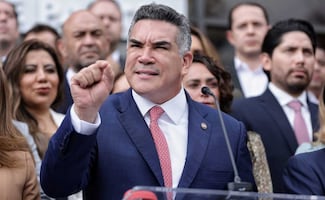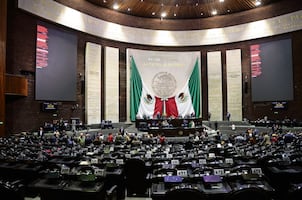Más Información

Alito Moreno afirma que México debe ser aliado de EU ante dictaduras como la de Maduro; "¡Venezuela libre ya!”

Morena va contra “Ley Esposa” en SLP que postula solo mujeres en 2027, señala Alcalde; prepara acción de inconstitucionalidad
Mexican President Andrés Manuel López Obrador
said on Monday contracts private companies have with state-run power utility CFE should be revised to keep electricity prices low, sending shares in one firm tumbling.
“We are urging companies that have agreements with the Federal Electricity Commission (CFE) to come together to review contracts and above all to reach an agreement that electricity prices will not increase,” López Obrador said during his morning press conference.
The president, a leftist who took office in December , pledged during the campaign to strengthen the CFE and avoid energy price hikes during his term.
López Obrador noted that the state-owned utility is already contractually obliged to pay billions of dollars to the private companies that developed seven natural gas pipelines to supply power plants , even though the projects are incomplete and unable to deliver gas.
Those companies are Mexican energy infrastructure firm IEnova, a unit of U.S.-based Sempra Energy; TransCanada Corp; and Mexican tycoon Carlos Slim’s Carso , said CFE chief Manuel Bartlett .
Over the past couple decades, Mexico has transitioned to natural gas to generate most of its power, relying increasingly on imports via pipeline from the United States .
At López Obrador’s behest, Bartlett cited by name several former public servants who are now energy company executives, accusing them of taking part in a scheme to “destroy” the CFE.
“If the pipelines can’t be built, as is happening in seven large gas pipelines, the companies still have to be paid even if there’s no gas,” said López Obrador.
IEnova’s shares dropped as much as 6.95 percent
, TransCanada’s 0.67 percent and Carso’s 0.94 percent after the comments.
In a statement to the Mexican stock exchange, IEnova said it has one pipeline that began operations in 2017 but that “sabotage” interrupted supplies to CFE.
Some companies have been unable to complete construction of pipelines because of opposition from local communities. In other cases, the companies cannot deliver the gas even though the pipelines have been completed because of delays in building and converting power plants.
López Obrador has been a staunch critic of 2013-14 energy reforms that ended the wholesale electricity monopoly held by CFE.
“We are looking to achieve a voluntary restructuring of agreements and commitments within the framework of the law ... the government is committed to not increasing electricity prices for consumers, but we want private companies to help,” he said.
This morning, however, President López Obrador said that he will respect contracts that companies have with CFE for pipelines that are not operational despite his criticism of how much the arrangements cost. Nevertheless, he trusted that a multilateral dialogue between the government and private companies could be achieved for the benefit of the Mexican people.
“It is unethical that the CFE be obliged by contract to pay for these onerous sanctions. We will not be shysters. What we want is to convince them to renegotiate their contracts for the benefit of our citizens. Bad deals such as this do not exist anywhere else in the world. I don’t know why they thought they could take advantage of our country. Well, actually I do know; it is because past governments allowed it.”
“And why did they allow it? Because there was a direct association between the private and public sectors and no limits were set. They were in charge.”
Manuel Bartlett pointed out that, should these contracts be allowed to continue, the CFE would be condemned to bankruptcy.
dm
Noticias según tus intereses
[Publicidad]
[Publicidad]













